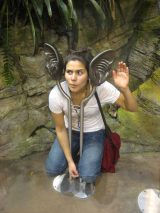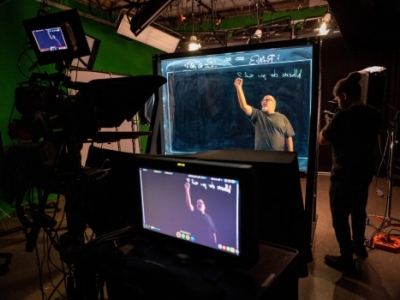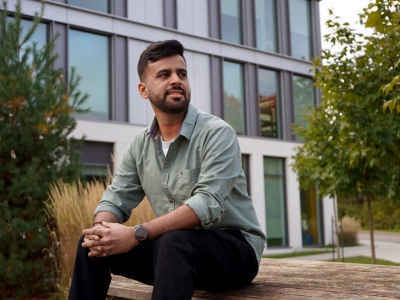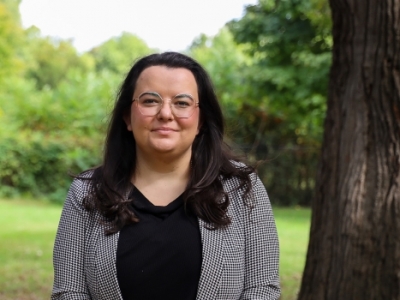Master’s student Nina Doré says she first became aware of American Sign Language (ASL) when she was walking down a Montreal Street in 2009 and happened to notice a sign advertising ASL classes. She signed up on the spot, went to classes on and off, and continued to practise with newfound friends after the courses finished.
“When I started my MA, I saw that not much had been done to develop research on ASL teaching for hearing students,” says Doré. “I had learned several other languages and taught a few, too, and so teaching has always been near and dear to me.”
 Doré says that learning ASL is a fantastic way to rethink communication. “My face, hands, and body all work in harmony….I think more clearly in the visual space that ASL requires. It also puts you in touch with the Deaf community and Deaf art (e.g. theatre, poetry, film, etc.), which hearing people might not otherwise be aware of. These things are all reasons to learn ASL. On the flip side, it means that these things are also at risk of being misunderstood and going awry with improper instruction and administration. That’s where I come in.”
Doré says that learning ASL is a fantastic way to rethink communication. “My face, hands, and body all work in harmony….I think more clearly in the visual space that ASL requires. It also puts you in touch with the Deaf community and Deaf art (e.g. theatre, poetry, film, etc.), which hearing people might not otherwise be aware of. These things are all reasons to learn ASL. On the flip side, it means that these things are also at risk of being misunderstood and going awry with improper instruction and administration. That’s where I come in.”
Explains the grad student: “Since ASL is becoming more popular in universities across North America, focusing more on its teaching will be helpful to ensure quality and sustainable growth of programs.”
As part of her research, she talked to four teachers of American Sign Language (ASL) at a Canadian university to find out how they “built” their curriculum without a textbook. “This particular program, unlike most, does not rely on a textbook for scope/sequence/etc.,” adds Doré. “My study mixed my voice in with the teachers’ in an attempt to give a story-like account. It was an experiment with mixing qualitative methods, finding my voice as a researcher, and beginning to explore in the field of ASL pedagogy, which is growing slowly but surely.”
Doré’s master’s research is now complete and she successfully defended her thesis on March 12.
When looking back on her MA, she says that, because she was in a smaller program, “I was able to get involved with the student society and get to know pretty much all of the students, teachers and administrators. I played a major role in organizing our student symposium, which was a fantastic experience in event planning and reaching out to students beyond our department. The sheer diversity of interests and expertise within the program is by far the most inspirational I could hope for in terms of branching out and exploring multiple areas.”
Doré is now planning to pursue her PhD in Applied Linguistics and Discourse Studies at Carleton. “My very encouraging supervisor, Dr. Janna Fox, made me realize that a PhD would be the ideal opportunity to keep growing my project with academic support (and funding). I have big ambitions for my PhD work, which will hopefully lead to research-type employment of a similar vein. There are things I think need to happen in ASL pedagogy and, given the time, I can do them. The PhD is step one.”
Doré will graduate on June 13th with her MA in Applied Linguistics and Discourse Studies.
Wednesday, May 14, 2014 in Grad Student Research
Share: Twitter, Facebook



